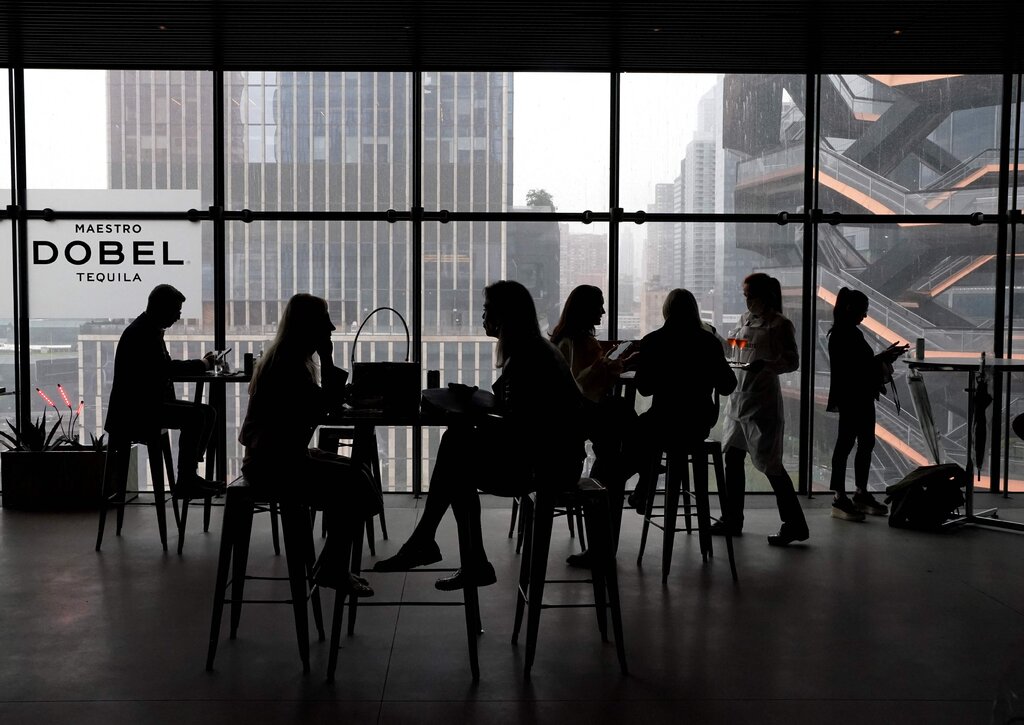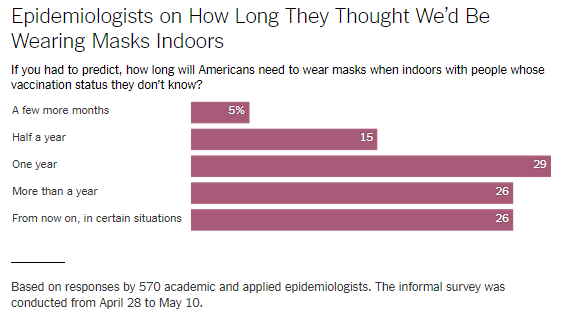
 i_need_contribute
i_need_contribute

At a cafe in Hudson Yards in New York City early this month. Such indoor gatherings may become more common in response to new federal health guidelines.Credit...Timothy A. Clary/Agence France-Presse — Getty Images
When federal health officials said on Thursday that fully vaccinated Americans no longer needed to wear masks in most places, it came as a surprise to many people in public health. It also was a stark contrast with the views of a large majority of epidemiologists surveyed in the last two weeks by The New York Times.
In the informal survey, 80 percent said they thought Americans would need to wear masks in public indoor places for at least another year. Just 5 percent said people would no longer need to wear masks indoors by this summer.
In large crowds outdoors, like at a concert or protest, 88 percent of the epidemiologists said it was necessary even for fully vaccinated people to wear masks.

“Unless the vaccination rates increase to 80 or 90 percent over the next few months, we should wear masks in large public indoor settings,” said Vivian Towe, a program officer at the Patient-Centered Outcomes Research Institute.
The responses came from 723 epidemiologists, submitted between April 28 and May 10, before the new guidance from the Centers for Disease Control and Prevention. The survey asked epidemiologists about being outdoors in groups of various sizes, and about being indoors with people whose vaccination status was unknown. The situations were consistent with the new guidance, which governs behavior in public places, regardless of size, where it is impossible to know the vaccine status of others.
Federal health officials have already said that vaccinated people can be indoors with other vaccinated people, and epidemiologists mostly agreed. But the C.D.C.’s new guidance said masks were no longer necessary for fully vaccinated people regardless of the size of the gathering and whether it was indoors or outside, except in certain situations, like in a doctor’s office or on public transit.
Epidemiologists are, on the whole, very cautious when it comes to Covid-19, by nature of their training in understanding risk and preventing the spread of infectious disease. Nearly three-quarters described themselves as risk-averse, and they are likely to have been able to work from home over the past year, unlike many Americans. But they also have the same training as many of the scientists at the C.D.C. who devised the new policy, and about one-third of the survey respondents work in government, mostly at the state level.
They acknowledged that many Americans would not want to continue to wear masks — and that many have already stopped.
Wearing masks “will be a need, which is a very different question than how long will it continue to occur,” said Sophia K., an epidemiologist at the Great Lakes Inter-Tribal Council. “I expect that most people will refuse to wear masks, even in public, by the end of 2021, whether there is still a pandemic or not.”
Many epidemiologists echoed the C.D.C. in saying that as long as people were fully vaccinated, they could gather without precautions. But the C.D.C. went further than the epidemiologists by giving the OK for vaccinated people to stop masking in groups with an unknown number of unvaccinated people.
“It is either you trust the vaccine, or you do not,” said Kristin Harrington, an epidemiology Ph.D. student at Emory. “And if we trust the vaccine, that means an unlimited number of vaccinated individuals should be allowed to gather together.”
Others acknowledged that policy decisions are based on many goals, such as invigorating the economy and incentivizing people to get vaccinated.
Yet most said mask-wearing continued to be necessary for now, because the number of vaccinated Americans had not yet reached a level that scientists consider necessary to significantly slow the spread of the virus. Until then, there are too many chances for vaccines, which are not 100 percent effective, to fail, they said.
“Crowded circumstances, indoors or outdoors, necessitate a mask until community levels of Covid are much lower,” said Luther-King Fasehun, a doctor and an epidemiology Ph.D. student at Temple University.
Sally Picciotto, an epidemiologist at the University of California, Berkeley, said the decision to stop wearing masks indoors “depends on more people rolling up their sleeves to get the shot.”
Respondents also said that as long as the virus was still spreading, masks were important to protect high-risk people and those who cannot be vaccinated, like children or people who have underlying health conditions.
“Until community transmission is lower, it protects the whole community and the other people in the room to wear masks,” including children, immunosuppressed people and Black and Latino communities who have been hit harder by Covid-19, said Julia Raifman, an assistant professor of public health at Boston University.
One-quarter of the epidemiologists in the survey said they thought people would need to continue wearing masks in certain settings indefinitely, and some said they planned to continue to wear them in places like airplanes or concert halls, or during the winter virus season.
“Heck, I may wear a mask for every flu season now,” said Allison Stewart, the lead epidemiologist at the Williamson County and Cities Health District in Texas. “Sure has been nice not to be sick for over a year.”
Alana Cilwick, an epidemiologist at the Colorado Department of Public Health, said, “I plan to wear a mask indoors for the foreseeable future given the amount of vaccine hesitancy we are seeing, especially in higher-risk settings like the gym or on an airplane.”
Just one-fifth of epidemiologists said it was safe for fully vaccinated people to socialize indoors without masks in a group of unlimited size. A majority said indoor gatherings should be limited to five or fewer households.
Even outside, where the coronavirus is much less likely to spread, nearly all the epidemiologists said it was necessary to keep wearing masks in crowds, when people are near others whose vaccination status they don’t know.
“Masks are the second-most helpful prevention strategy we have to vaccines,” Professor Raifman said.